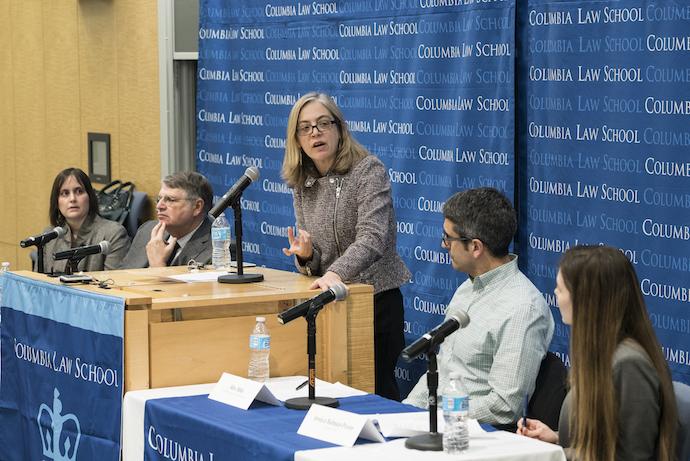Constitutional Questions in the Age of Trump
Columbia Law School professors gather to discuss immigration, federalism, free speech, and executive orders.
|
From left: Visiting Professor Cristina Rodriguez, Professor Thomas Merrill, Professor Gillian Metzger ’96, Alex Abdo, a staff attorney at the Columbia University Knight First Amendment Institute, and Professor Jessica Bulman-Pozen. |
In the legal community, students, professors, and practitioners are arguably more concerned than ever with potential threats to the U.S. Constitution under the current presidential administration. To delve deeper into this controversial topic, the Columbia Law School community gathered on March 22 for a panel discussion, “The Constitution in the Age of Trump.”
“It’s a time in which many of us believe that the strength of our constitutional democracy is being tested,” said Olatunde Johnson, the Jerome B. Sherman Professor of Law and Vice Dean for Intellectual Life, in her welcoming remarks before an audience of more than 100 students, faculty, and alumni. “For all of us, it’s really a time in which we’re called upon to stretch ourselves.”
The program—a 90-minute conversation that focused on immigration, federalism, free speech and the nature of executive orders—featured Professor of Law Jessica Bulman-Pozen; Thomas Merrill, the Charles Evans Hughes Professor of Law; Gillian Metzger ’96, the Stanley H. Fuld Professor of Law; Cristina Rodriguez, the Samuel Rubin Visiting Professor of Law; and Alex Abdo, a staff attorney at Columbia University’s new Knight First Amendment Institute.
Rodriguez discussed the pros and cons of President Donald Trump’s second executive order that banned visitors from six predominantly Muslim countries, which has been blocked in part from enforcement by federal judges in Hawaii and Maryland. She explained that the administration had made positive changes from the first order (which Columbia Law School Dean Gillian Lester publicly criticized in January), such as not barring lawful U.S. citizens, or those with valid visas from the designated countries, from traveling to and from the U.S.
“On one level, it’s disappointing because the case could have been a vehicle for clarifying the parameters of due process rights of immigrants who hold temporary visas,” she added. “But we’ll take the decision of the order rather than wait for the exciting litigation to unfold.”
The constitutional question at the center of the immigration executive order conversation, Rodriquez explained, is the extent to which extramural statements that the president and his surrogates made about banning Muslims to the press during the campaign is relevant to the constitutional analysis of the executive order. “It’s clear under Establishment Clause doctrine and equal protection doctrine that intent and context beyond the four corners of the order matters,” she said. “But how far do we take that context and what kinds of statements actually matter?”
Merrill agreed, saying the second executive order was “scrubbed and lawyerly,” but that Trump and his associates’ “intemperate and poorly conceived statements” were crucial to courts’ rulings. “If this [second] order had been issued by Barack Obama, there’s no way any judge in the United States would have declared it unconstitutional . . . there is no mention of religion,” he explained.
Bulman-Pozen raised another controversial immigration issue: the constitutionality of “sanctuary cities” refusing to enforce immigration law, and the right of the U.S. attorney general and secretary of homeland security to punish these cities by withholding federal grants. “Some jurisdictions have gone to court seeking both declaratory and injunctive relief, including San Francisco and Santa Clara, and they are raising a variety of constitutional arguments about this executive order, including the separation of powers argument,” she added.
According to Metzger, the Trump administration’s compliance strategy is not unprecedented. “If you think about spending power, it’s how we enforce a lot of civil rights obligations,” she said. “It’s a critical tool the federal government uses to ensure accountability to its programs.”
The Trump administration’s interpretation of the law—and its potential impact on freedom of expression for whistleblowers and journalists—is a major concern for Abdo, who, until recently, was a senior staff attorney for the ACLU’s Speech, Privacy, and Technology Project. “Much of the anxiety about the Trump administration is the realization that individual liberties depend so much on mores rather than law,” he said. “It’s one of those areas where someone intent on changing mores could do quite a bit of damage, at least initially.”
Merrill reminded the audience that it was President Bill Clinton who expanded executive power by promulgating regulations and policies with presidential “directives,” a strategy that he said was replicated by Obama. “So what Donald Trump seems to be doing to me is he’s taking the Clinton-Obama tactic of presidential directive and sort of heightened it to the level of the executive order,” he continued. “There is really no legal distinction between these directives and executive orders, but they sound more like commands, more like something a general would tell an army to do.”
Merrill worries about the ramifications of White House operatives directing federal agency regulations. “It could be that government by presidential order will not only turn the administrative process into a charade, eliminating the agencies’ expertise, eliminating realistic public participation, [but] it might also cut off judicial review under current doctrine,” he said.“It’s too soon to say if that is what is going to happen.”
“The Constitution in the Age of Trump” is part of the Lawyers, Community and Impact Series. Sponsored by the Dean's Office, this series strives to build community by bringing deeper context and perspective to the work done both inside and outside the classroom. The event was organized in conjunction with the Center for Constitutional Governance and Student Services.
Watch the full panel discussion here:
###
Posted on March 31, 2017
